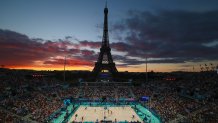The Olympics are revered for their storied legacy, but there is one tradition that isn’t so celebrated – once opulent Olympic venues repeatedly neglected and turned into forgotten relics once the games are over.
“We've got the ruins of ancient Olympia in Greece, but now we've got the ruins of modern Olympia,” said historian Miles Osgood, a Stanford University lecturer who has been studying the cultural impact of the Olympic games for nearly a decade.
“You have all of these single-use stadiums in the suburbs…that saw a little bit of action for the Olympics and then we're allowed to crumble.”
An entire aquatics park was left abandoned in Brazil after the 2016 Summer Olympics in Rio de Janeiro, athlete housing is now nothing more than rundown apartments in Greece following the 2004 Summer Olympics in Athens, and bobsled tracks – covered in graffiti – lead to nowhere after they were showcased in the 1984 Winter Games in Bosnia.

Venues at Paris Summer Games resemble Olympic roots
Paris has noticeably tried to return to the glory days of the Olympics by hosting the games in the heart of the city, instead of constructing new and permanent facilities in the outskirts of town. The Seine river was used for the swimming portion of the triathlon, while temporary seating helped transform the Eiffel Tower into the world’s most vibrant beach volleyball court. In fact, roughly 95% of the Olympic venues used during the current Paris Games either already existed or were designed to be temporary, according to the Paris 2024 Olympic Organizing Committee.
“Paris 2024 is proving that it’s possible to stage a spectacular, inclusive, and unique games in a more responsible, more sustainable and more useful manner,” said Tania Braga, Head of Olympic Games Impact and Legacy for the International Olympic Committee.

LA vows to rely on existing or temporary arenas for 2028 Games
Get a weekly recap of the latest San Francisco Bay Area housing news. >Sign up for NBC Bay Area’s Housing Deconstructed newsletter.
Sports
Los Angeles is set to host the next Summer Olympics in 2028 and has already pledged to be the first Olympic Games in modern history to forgo building any permanent venues. Instead, LA will make use of existing facilities like the Lakers’ home arena downtown and the nearby LA Memorial Coliseum.
“The combination of all that allows us to a deliver a games that’s not about construction projects,” said Casey Wasserman, chair of the LA28 planning committee, who made the comments in a promotional video released by his group.
“It’s about embracing the community, embracing the city, welcoming the world into our existing facilities, into our existing infrastructure, and doing it in the most innovative and dynamic way we can do it.”
Los Angeles followed a similar mantra the last time it hosted the Summer Games in 1984, which many experts still consider the only modern Olympics that was profitable.
While building less certainly brings environmental benefits, the decision for cities to use what they already have is largely about cost. The Olympics are notorious for running overbudget by billions of dollars. On average, Olympic host cities pay 159% more than what was originally budgeted, according to researchers at the University of Oxford.
In fact, Budapest, Hamburg, and Rome all pulled out as potential host cities for the current games because of budget concerns, leaving just Paris and Los Angeles.
The International Olympic Committee then took the unusual step of simultaneously offering Paris the 2024 Games and LA the host spot for the 2028 games – essentially skipping the selection process for the next Summer Olympics amid concerns the IOC would struggle to find a willing host.
Historian Miles Osgood says the best way to recruit cities in the future is to look to the past.
The founder of the Olympics, Pierre de Coubertin, really cared about the games being beautiful and incorporating arts and culture – a beautiful architectural surrounding and then a beautiful civic surrounding, Osgood said. “So for Paris to bring things back into some of its most iconic spaces and before some of its most iconic landmarks…I think fulfills that esthetic legacy.”
At an expected price tag of nearly $9 billion, the Paris Olympics will likely be one of the cheapest Summer Games in decades. Los Angeles hopes to cut costs even more in 2028 with an estimated budget of roughly $7 billion, but even that figure has already ballooned by about 30 percent from the original budget.
The push for cities to build less, however, could carry unintended consequences of dramatically reducing the number of countries eligible to host the Olympic games in the future.
“It immediately shrinks the group of potential hosts to cities who have already hosted the Olympic Games,” said Alexander Budzier, who has studied the economic impact of the Olympic Games dating back to the 1960 Olympics in Rome.
“It will be very, very unlikely that we will see another city from an emerging economy or…that hasn’t hosted the games already to stage a new edition of the games,” Budzier added.
“On the other hand, you have the Olympic movement, that has the goal and objective and the value to increase sport participation globally.”
Contact The Investigative Unit
submit tips | 1-888-996-TIPS | e-mail Bigad




